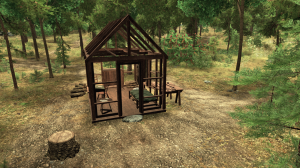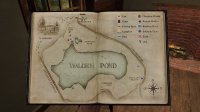A Stunning Educational Video Game Brings Students Inside Thoreau’s ‘Walden’
High school students can explore core ideas like self-reliance and civil disobedience as they read Walden and engage in the game.
Your content has been saved!
Go to My Saved Content.American philosopher Henry David Thoreau wrote about his famous transcendental experiment of self-reliant living at Walden Pond in the 1854 classic book Walden; or, Life in the Woods. In this book, taught in many high school English language arts (ELA) and social studies classrooms, students may struggle to understand Thoreau’s words and abstract ideas, even as the concepts of civil disobedience and connection to the environment hold important lessons for understanding issues affecting today’s world.
What if there were a video game that brought the book to life for struggling readers, meeting students where they are? After all, research suggests that the multiple modalities in video games can be harnessed to support literacy skill development. Tracy Fullerton and the University of Southern California’s Game Innovation Lab created an immersive game based on Thoreau’s classic book. Walden, a game EDU is an award-winning video game where players follow in Thoreau’s footsteps, surviving in the woods by finding food and fuel and maintaining their shelter and clothing. At the same time, players are surrounded by the beauty of the woods and the pond, which hold a promise of a sublime life beyond these basic needs.
This classroom-friendly video game is actually a series of 20- to 30-minute standalone episodes with supporting lessons. Similar to the structure of self-contained television episodes, each streams in a web browser on a Chromebook or any low-power computer, no installation required. With an extension grant from the National Endowment for the Humanities, I was part of an interdisciplinary team that developed high school–level lesson plans around each episode. Both the game and the lesson plans are free to all teachers.
Lesson Plans for ‘Walden, a Game EDU’
Each printable set of lesson plans aligns with an episode. The lesson flow starts with a brief, offline warm-up. Next, students play the game episode. Each has a different goal, depending on the lesson’s overarching objectives. Then students read Thoreau offline while answering questions on graphic organizers. Finally, there are projects that deepen learning around the lesson’s main ideas.
The lessons include the following curricular components:
- Essential questions
- Higher-order thinking objectives, aligned to content standards
- Offline warm-up activities
- Recommended times and approaches for game play
- Paired reading of Thoreau’s written texts
- Printable graphic organizers to document student thinking
- Whole-class discussion prompts
- Project-based learning assignments
- Exit-ticket questions, rubrics, and other assessments
Lessons Where Students ‘Learn Deliberately’
Self-Reliance: In this ELA and social studies set of lessons, students explore Thoreau’s thoughts on self-reliant living and his critique of materialism in early industrial society in America. The essential question posed to students is, “What is a basic need and what is a luxury?”
The warm-up activity, which takes about 15 minutes to complete, is designed to help students make personal connections to Thoreau’s experiment of living in the woods. The activity includes index cards that teachers print and distribute. Each card features one item, such as a bottle of water, bug spray, a candy bar, and a cell phone. Students then debate about ranking the items based on what they would deem necessary when living off the grid.

Next, students play the “Self-Reliance” episode for about 20 minutes. Students play as Thoreau, living in nature, maintaining what he called the “necessaries of life”: food, fuel (firewood), shelter, and clothing. While finding or growing food, fishing, and building shelter, they find inspiration in quotes from the book that can be discovered as they explore. Offline, they read suggested paired passages from Thoreau. Printable reading comprehension questions are included.
Where I Lived: In this social studies set of lessons, students explore the geography of Walden Woods for traces of other people who lived there, including European Americans, Indigenous people, and enslaved and freed Black people. The essential question for these lessons is, “Whose voices and histories are left out of the story of a place?”
As in “Self-Reliance,” there is a 15-minute warm-up available from a printable PDF. In this activity, called “Lost in the Shuffle,” students first read an introductory sentence out loud to their group: “Henry Thoreau lived in the woods on the shore of a pond named Walden, near a town called Concord, in Massachusetts.” Next, students take turns drawing cards that teachers print and cut out. Some cards include sentences from Thoreau or European Americans. Gradually, sentences featuring the stories of marginalized people are included. As students play, they hear and discuss how the stories change.
Next, students play “Where I Lived,” the accompanying game episode, for about 20 minutes. As they play, they search for ancient artifacts from Indigenous peoples, ruined shanties of immigrant railroad workers, stone cellar holes from the homes of formerly enslaved peoples, a copy of the abolitionist journal The Liberator, and other artifacts. Students then visit various shared websites, like Native Land and WhatWasThere, to learn more about who lived on the land where they reside. An offline note-taking tool is provided, as are discussion prompts.
What I Lived For: Social and emotional learning is infused in this set of lessons, where students are invited to take a mindful walk in virtual woods, guided by the essential question, “How can we practice being fully present to our inner and outer worlds: ‘precisely the present moment,’ as Thoreau writes?” The “What I Lived For” episode is not goal-oriented; there is no need to worry about survival or artifacts to collect. Instead, students are given about 20 minutes to freely explore the beautiful virtual environment.
The lessons have time for reflective journaling, including a project-based-learning culminating activity. In it, students are encouraged to design a notebook journal with descriptive vocabulary prompts on their own Walden Pond, which can be a local park or trail, or any place of solace. Students are then invited to share their journals with classmates so that peers can literally walk in their shoes, deepening perspectives on mindfulness.
Civil Disobedience: The civics unit focuses on Thoreau’s 1849 essay “Civil Disobedience,” exploring themes of freedom, slavery, abolitionism, expansion, and human rights. The essential question, as relevant today as it was nearly 175 years ago, is “How can we engage in civic action that is authentic, responsible, and engaged?” This unit is currently under development; when it’s complete, students will consider what it means to be free as they interact with objects, news clippings, and nonplayable characters in the “Civil Disobedience” episode.
Students can join conversations with various citizens of Concord, such as a group of female abolitionists who are discussing the relationship between the fight to end slavery and women’s rights. Students can also choose their position on critical issues as articulated by this group and others they find in the town. Included are offline graphic organizers and passages from Thoreau, all designed to promote youth civic engagement.
Thoreau famously wrote, “I went to the woods because I wished to live deliberately.” More than experimenting with whether he could live off of the 19th-century grid, he desired to learn from nature and to share those lessons with others. Our intention with these lessons is for students to play deliberately, to journal, and to experience the sublime meaning behind his words. Who knows—today’s students can become tomorrow’s Thoreau!
